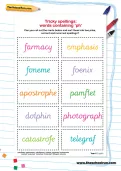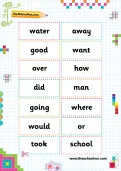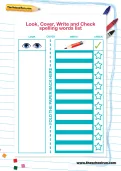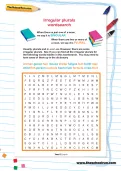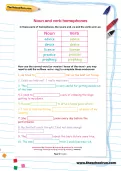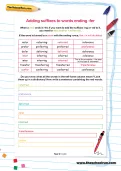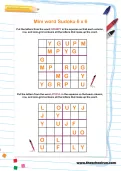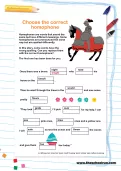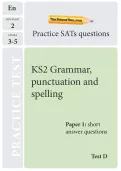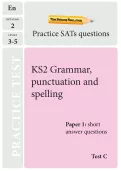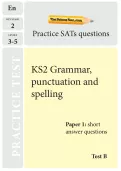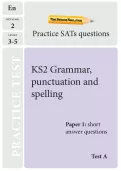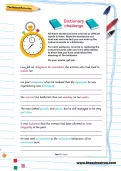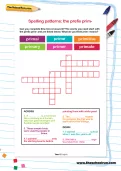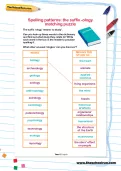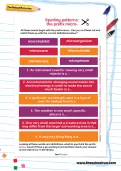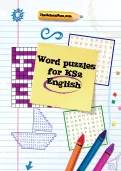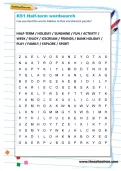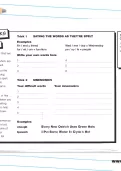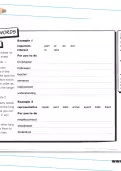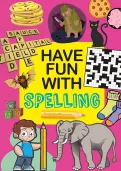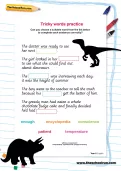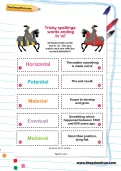A Year 6 English worksheet created by an experienced teacher to help your child learn about noun and verb homophones.
or
Register to add to your saved resources
Already a subscriber? to view this content.
A Year 6 English worksheet created by an experienced educator to teach your child about adding suffixes to words ending -fer.
When a verb ends in -fer, if you want to add the suffixes -ing or -ed to it, you need to add another r at the end. If the word is turned to a noun with the ending -ence, the r is not doubled. Now see if you know what all the words in the left-hand column mean. Can you write a sentence containing the red words?
or
Register to add to your saved resources
Already a subscriber? to view this content.
Put the letters from the word GRUMPY in the squares so that each column, row, and mini-grid contains all the letters that make up the word.
or
Register to add to your saved resources
Homophones are words that sound the same but have different meanings. Some homophones are pronounced the same way but are spelled differently. In this story, some words have the
wrong spelling. Can you replace them with the correct homophone?
or
Register to add to your saved resources
Already a subscriber? to view this content.
Help your child revise for the new 'SPAG' test, which tests grammar, punctuation and spelling as part of KS2 SATs. Our 'mock' papers will help familiarise them with the question format and boost their confidence with some at-home practice.
or
Register to add to your saved resources
Already a subscriber? to view this content.
Written in the style of the new KS2 SATs Grammar, punctuation and spelling test, our 'SPAG' practice papers will offer your child the chance to get to grips with the question format and practise in preparation for the Y6 tests in May.
or
Register to add to your saved resources
Already a subscriber? to view this content.
Adverbs, clauses, correct punctuation and sentence analysis are all part of the new KS2 SATs Grammar, punctuation and spelling test. Help your child revise in preparation for the May assessments with our practice papers, written in the style of the 'SPAG' test.
or
Register to add to your saved resources
Already a subscriber? to view this content.
A new statutory test of English grammar, punctuation and spelling was introduced for children at the end of Key Stage 2 from 2013. Help your Y6 child prepare for the 'SPAG' test with our practice papers, written in the style of the new test by a KS2 teacher.
or
Register to add to your saved resources
Already a subscriber? to view this content.
See if you can find all the irregular plural nouns for the following words hidden in this teacher-created wordsearch. You may need to look some of them up in the dictionary.
or
Register to add to your saved resources
All these sentences have unusual or difficult words in them. Read the sentences out loud and see how fast you can look up the coloured words in a dictionary. For each sentence, re-write it, replacing the coloured words with your own alternatives to show that you have understood the meaning of the sentence. On your marks, get set...
or
Register to add to your saved resources
Already a subscriber? to view this content.
Can you complete this mini-crossword? The words you need start with the prefix prim- and are listed below. What do you think prim- means?
or
Register to add to your saved resources
Already a subscriber? to view this content.
The suffix ‘ology’ means ‘to study’. Can you look up these words in the dictionary and find out what study they relate to? Write each word in the box in the middle to practise spelling it. What other unusual ‘ologies’ can you discover?
or
Register to add to your saved resources
Already a subscriber? to view this content.
All these words begin with the prefix micro-. Can you cut them out and match them up with the correct definitions? Looking at these words and definitions, what do you think the prefix micro- means? Have a go working it out and then check your answer on the internet or in the library.
or
Register to add to your saved resources
Already a subscriber? to view this content.
Are you and your child tired of the same old English revision and practice sessions? Try something completely new and give them these fun English word puzzles instead! They'll review everything from connectives to apostrophes, using what they learn in class to solve codes, crosswords and wordsearches.
or
Register to add to your saved resources
Already a subscriber? to view this content.
Use this wordsearch during half-term to help your child with vocabulary and spelling while recognising words that are all about having fun!
or
Register to add to your saved resources
Teach your KS2 child these two simple tricks to help them remember how to spell words which don't follow the usual rules.
or
Register to add to your saved resources
Already a subscriber? to view this content.
Challenge your child to find short words within longer words, then create and spell new words using a limited number of letters.
or
Register to add to your saved resources
Already a subscriber? to view this content.
Does your child’s spelling really let their writing down? Have fun with spelling offers you practical and effective strategies to help support your child’s learning at home, based on a real understanding of how spelling is taught and why it’s tricky to master. The bad news? Your child will be beating you at Scrabble before you know it!
or
Register to add to your saved resources
Already a subscriber? to view this content.
This worksheet lists incomplete sentences which need to be completed by choosing from the list of tricky words at the bottom.
or
Register to add to your saved resources
Already a subscriber? to view this content.
This worksheet lists words that are tricky to spell ending in ‘al’. Children need to cut up the words and definitions and then match them up.
or
Register to add to your saved resources
Already a subscriber? to view this content.
